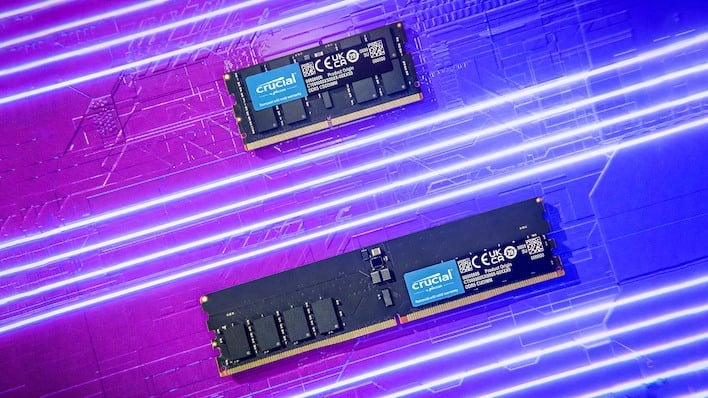
If you read that headline and are thinking that 6400 MT/s isn’t really fast for DDR5, then you’ve fallen into the same trap we did. The key detail is that the new modules, which feature a clock driver directly on the memory module itself, don’t require overclocking to hit that speed. DDR5-6400 is a new JEDEC speed standard, enabled by the release of these new clock-driver-equipped CUDIMMs. Further, Micron—specifically its consumer brand Crucial—is the first to market with memory modules based on the JEDEC raw cards for the CUDIMM and CSODIMM standards.
Since these modules aren’t overclocked, you should be able to drop them directly into any platform that supports CUDIMMs and immediately be up and running at 6400 MT/s. Said platforms include both Intel’s new LGA 1851 socket for its Core Ultra 200 processors as well as AMD’s Ryzen 8000 and 9000 processor families in certain motherboards—likely those based on the X870 chipset.
CUDIMM and CSODIMM aren’t fundamentally different form factors from standard DDR5 DIMMs and SODIMMs, but they are electrically different, and won’t work without platform support. It’s not yet clear what exactly will happen if you slot DDR5 CUDIMMs into an unsupported platform, but we expect that even if it works, you probably won’t get the full rated speed.

While Micron is first to market with CUDIMMs you can actually buy, the company isn’t the first to announce CUDIMMs in general. Many other vendors including G.SKILL, Corsair, ADATA, Kingston, and several smaller companies have all announced CUDIMMs already, but those products are largely intended to be used with Intel XMP or AMD EXPO profiles, and also aren’t actually available yet. These new parts from Crucial, meanwhile, won’t affect your warranty.
While DDR5-6400 may not set enthusiasts’ hearts alight, it’s a solid 15% step up from the previous DDR5-5600 standard. Moreover, CUDIMMs will make memory overclocking easier and enable higher capacities. Micron says that it intends to scale its CUDIMM solutions up to 64GB per module early next year, opening the way for up to 256GB of RAM on consumer platforms. Meanwhile, JEDEC itself says that it expects CUDIMMs to hit 7200 MT/s this year—again, without overclocking—and to scale to at least 9200 MT/s in future revisions.